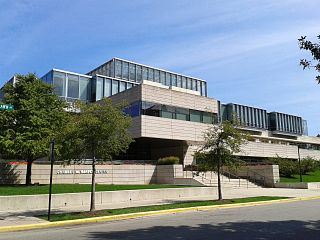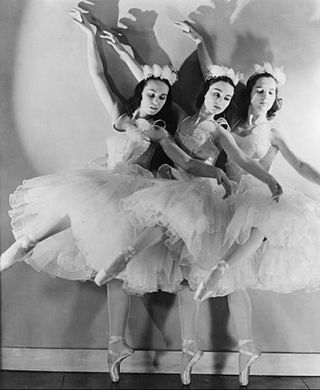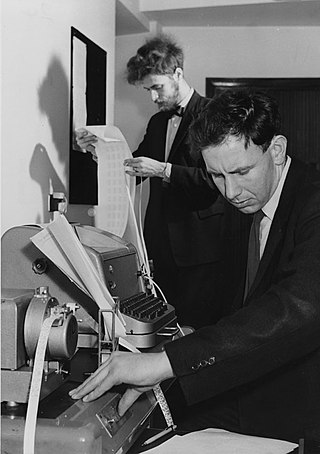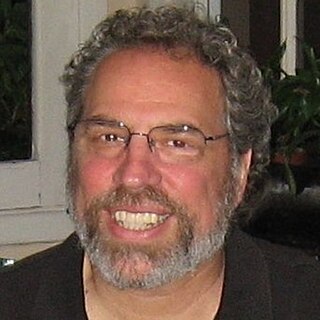Related Research Articles
The following outline is provided as an overview of and topical guide to statistics:

Monte Carlo methods, or Monte Carlo experiments, are a broad class of computational algorithms that rely on repeated random sampling to obtain numerical results. The underlying concept is to use randomness to solve problems that might be deterministic in principle. The name comes from the Monte Carlo Casino in Monaco, where the primary developer of the method, physicist Stanislaw Ulam, was inspired by his uncle's gambling habits.
Stochastic refers to the property of being well-described by a random probability distribution. Although stochasticity and randomness are distinct in that the former refers to a modeling approach and the latter refers to phenomena themselves, these two terms are often used synonymously. Furthermore, in probability theory, the formal concept of a stochastic process is also referred to as a random process.

Eugene Francis "Gene" Fama is an American economist, best known for his empirical work on portfolio theory, asset pricing, and the efficient-market hypothesis.
Nicholas Constantine Metropolis was a Greek-American physicist.

The University of Chicago Booth School of Business is the graduate business school of the University of Chicago, a private research university in Chicago, Illinois. Founded in 1898, Chicago Booth is the second-oldest business school in the U.S. and is associated with 10 Nobel laureates in the Economic Sciences, more than any other business school in the world. The school has the third-largest endowment of any business school.
The random walk hypothesis is a financial theory stating that stock market prices evolve according to a random walk and thus cannot be predicted.
In statistics, the Lilliefors test is a normality test based on the Kolmogorov–Smirnov test. It is used to test the null hypothesis that data come from a normally distributed population, when the null hypothesis does not specify which normal distribution; i.e., it does not specify the expected value and variance of the distribution. It is named after Hubert Lilliefors, professor of statistics at George Washington University.
The Shapiro–Wilk test is a test of normality. It was published in 1965 by Samuel Sanford Shapiro and Martin Wilk.
In statistics, resampling is the creation of new samples based on one observed sample. Resampling methods are:
- Permutation tests
- Bootstrapping
- Cross validation
- Jackknife

Raghuram Govind Rajan is an Indian economist and the Katherine Dusak Miller Distinguished Service Professor of Finance at the University of Chicago's Booth School of Business. Between 2003 and 2006 he was Chief Economist and director of research at the International Monetary Fund. From September 2013 through September 2016 he was the 23rd Governor of the Reserve Bank of India. In 2015, during his tenure at the RBI, he became the Vice-Chairman of the Bank for International Settlements.

The company Ballets Russes de Monte-Carlo was formed in 1932 after the death of Sergei Diaghilev and the demise of Ballets Russes. Its director was Wassily de Basil, and its artistic director was René Blum. They fell out in 1936 and the company split. The part which de Basil retained went through two name changes before becoming the Original Ballet Russe. Blum founded Les Ballets de Monte Carlo, which changed its name to Ballet Russe de Monte Carlo when Léonide Massine became artistic director in 1938. It operated under this name until it disbanded some 20 years later.

Shlomo S. Sawilowsky was a professor of educational statistics and Distinguished Faculty Fellow at Wayne State University in Detroit, Michigan, where he has received teaching, mentoring, and research awards.
Harry V. Roberts (1923–2004), American statistician, was a distinguished teacher and a pioneer in looking at the applications of Bayesian statistics to business decision making and in Total Quality Management.

Computational statistics, or statistical computing, is the study which is the intersection of statistics and computer science, and refers to the statistical methods that are enabled by using computational methods. It is the area of computational science specific to the mathematical science of statistics. This area is fast developing. The view that the broader concept of computing must be taught as part of general statistical education is gaining momentum.
The Journal of Accounting Research (JAR) is a leading peer-reviewed academic journal associated with the University of Chicago. It was established in 1963 and is published by Wiley-Blackwell on behalf of the Chookaszian Accounting Research Center at the University of Chicago Booth School of Business.
Raymond J. (Ray) Ball is a researcher and educator in accounting and financial economics. He is the Sidney Davidson Distinguished Service Professor of Accounting in the University of Chicago’s Booth School of Business. He has published foundational research on the economics of financial reporting and financial markets.
Anil K. Bera is an Indian-American econometrician. He is Professor of Economics at University of Illinois at Urbana–Champaign's Department of Economics. He is most noted for his work with Carlos Jarque on the Jarque–Bera test.

David S. Stoffer is an American statistician, and Professor Emeritus of Statistics at the University of Pittsburgh. He is the author of several books on time series analysis, Time Series Analysis and Its Applications: With R Examples with R.H. Shumway, Nonlinear Time Series: Theory, Methods, and Applications with R Examples with R. Douc and E. Moulines, and Time Series: A Data Analysis Approach Using R with R.H. Shumway.
References
- Nicholas Polson at University of Chicago Booth School of Business
- Nicholas Polson's Research page
- Article : Do leveraged funds deliver long term?
- Book chapter : Handbook of Financial Time Series
- arXiv preprint
- Riemmanian hypothesis book
- Youtube video on Riemman hypothesis